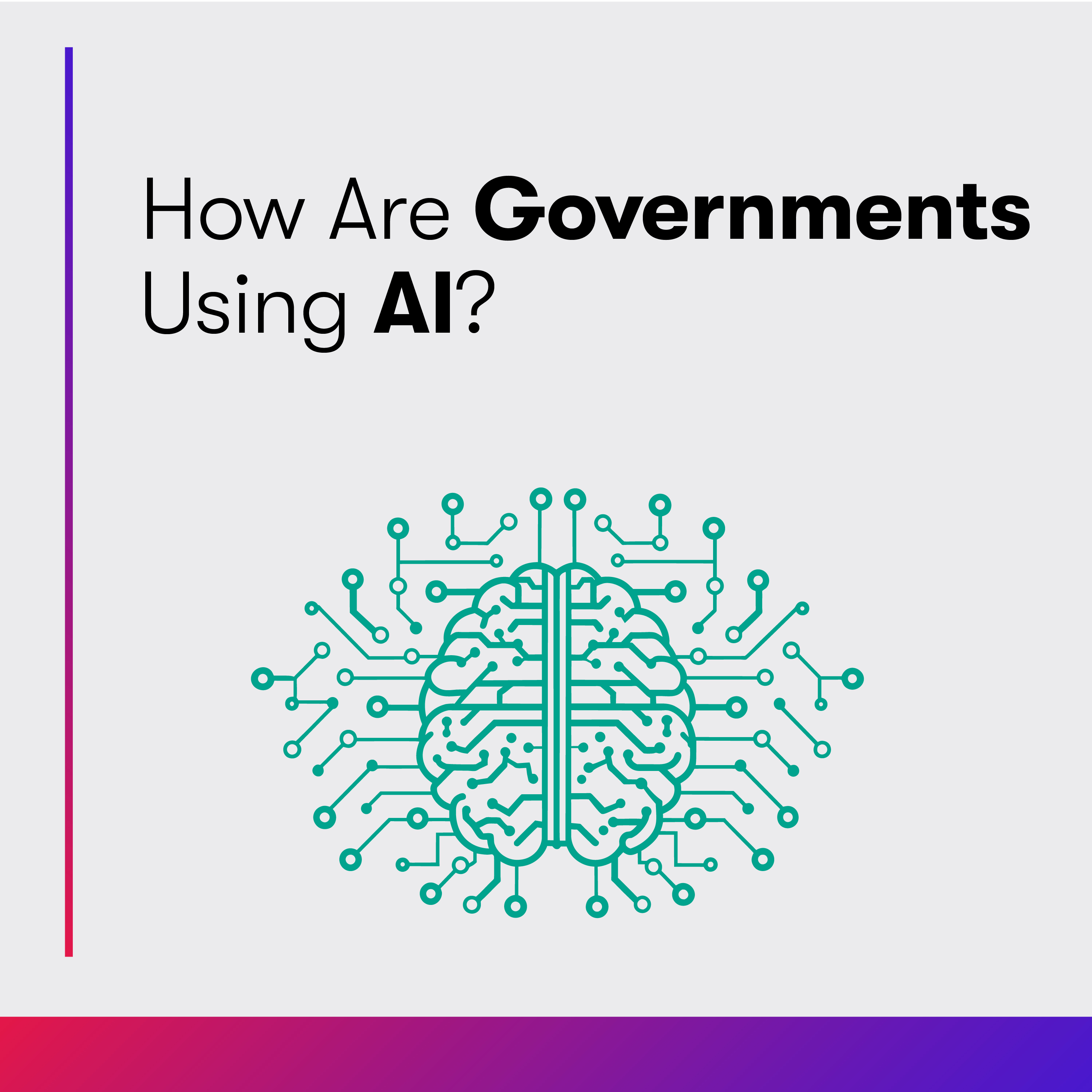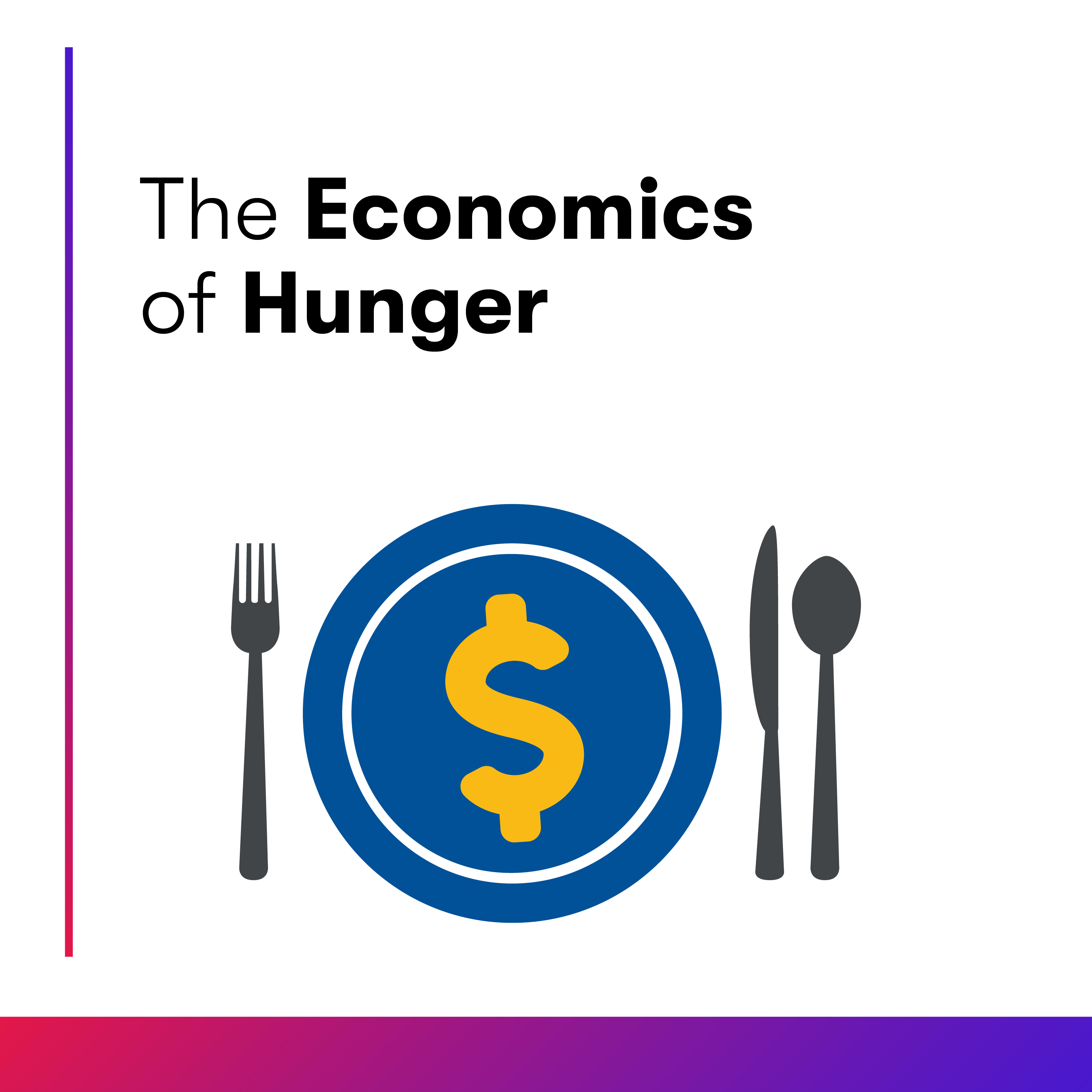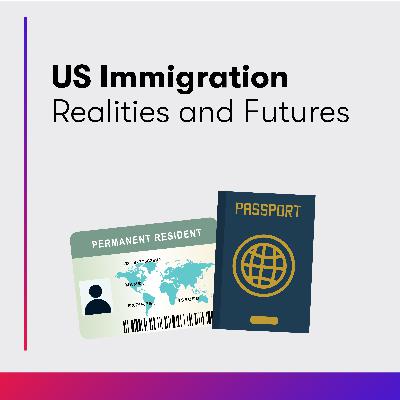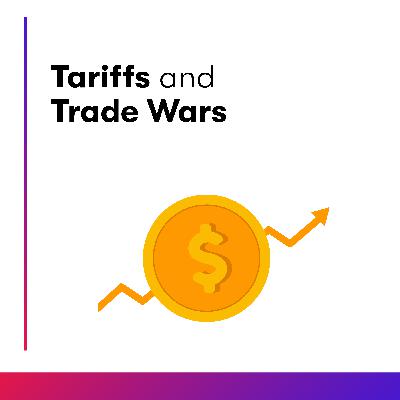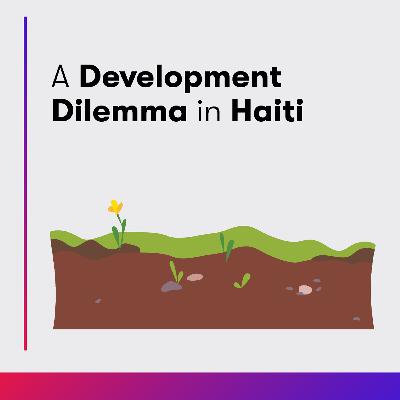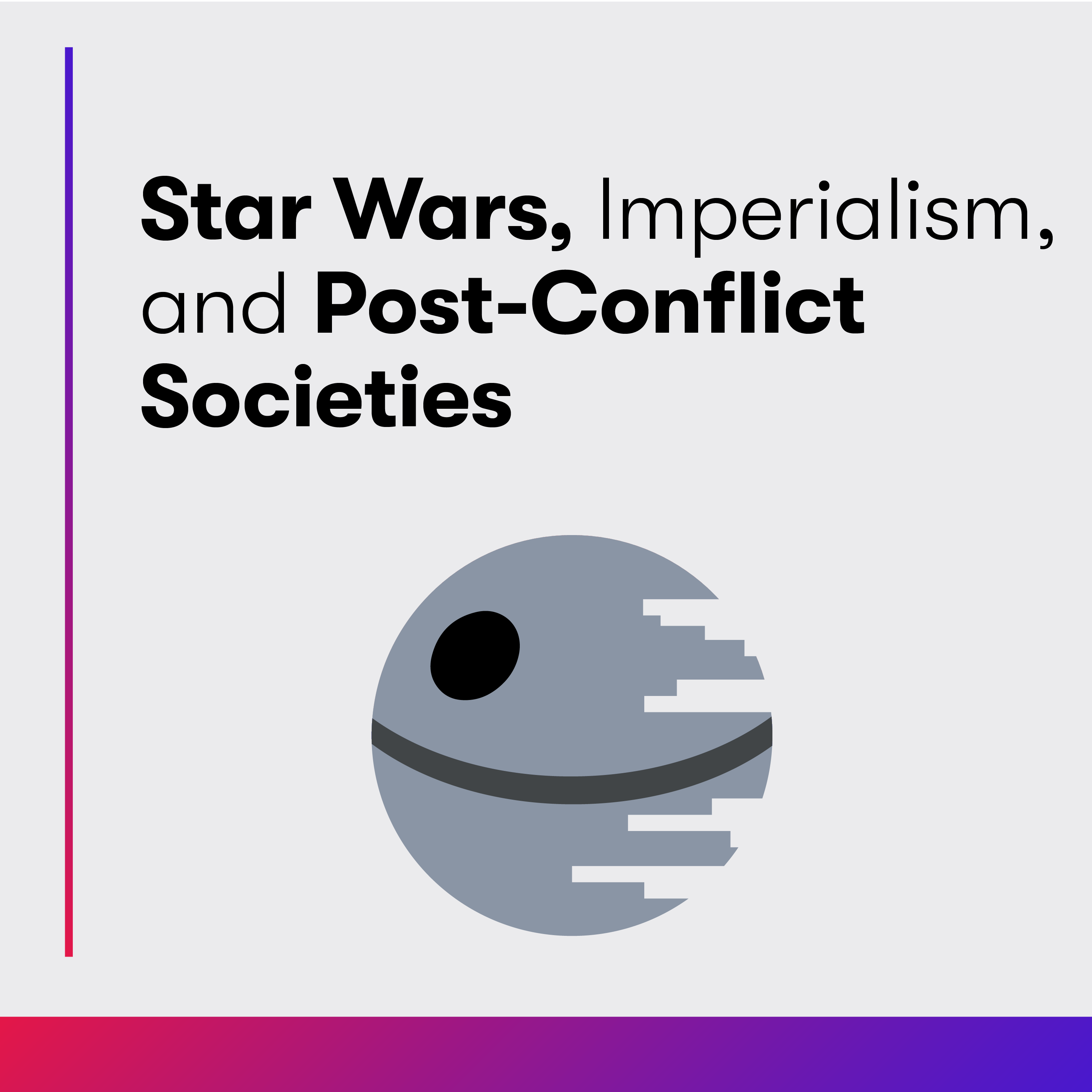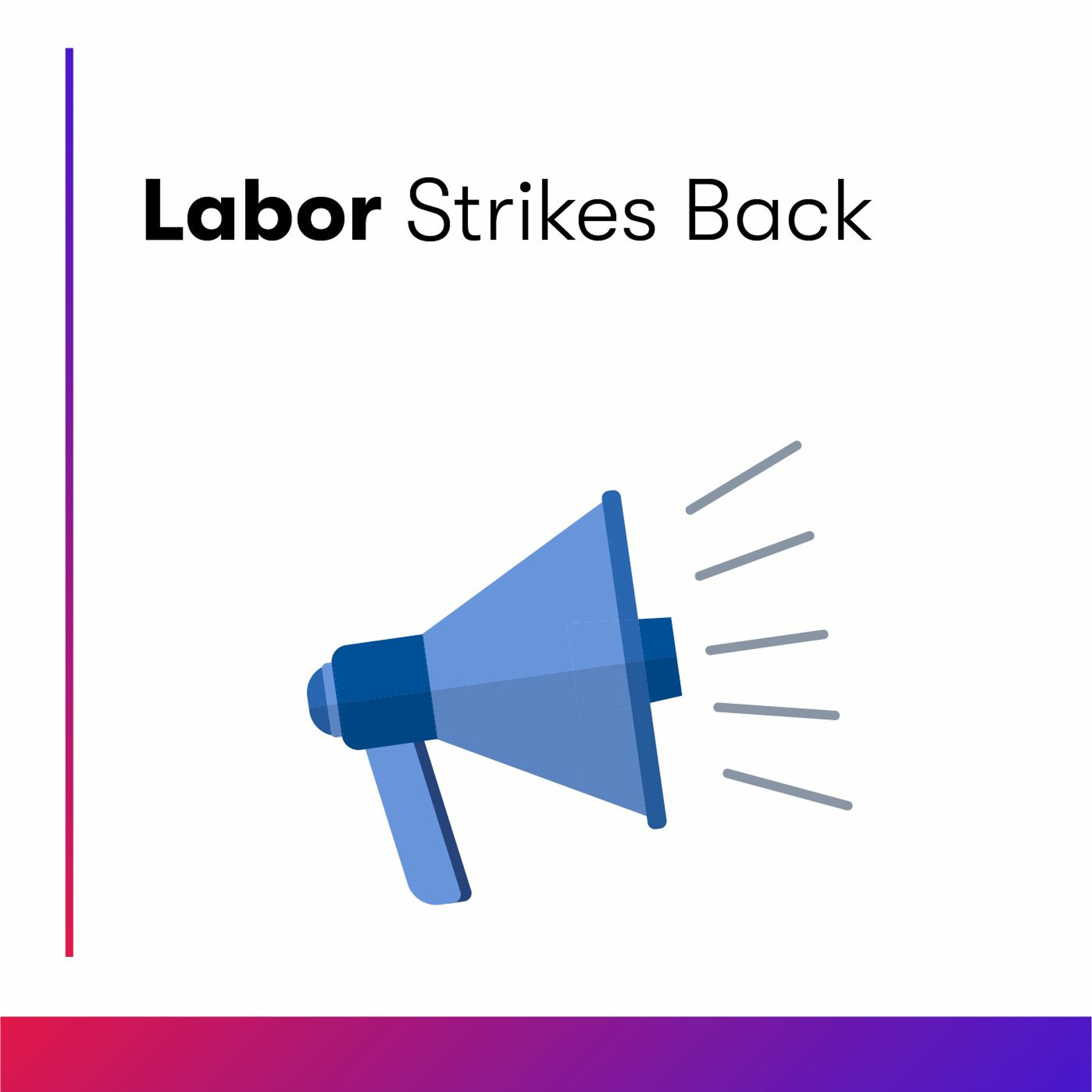Discover Big World
Big World

Big World
Author: Big World
Subscribed: 88Played: 1,272Subscribe
Share
© All rights reserved
Description
Big World shines a spotlight on complex ideas and issues that matter. Each episode features an expert from the School of International Service at American University in Washington, DC, breaking down a big, important topic into small bite sizes.
88 Episodes
Reverse
In this new episode, School of International Service professor and former US Ambassador to Mongolia Piper Campbell joins Big World to share reflections on her 30-year career in diplomacy and provide practical advice for aspiring foreign service officers.Campbell, the chair of the Department of Foreign Policy & Global Security, begins our conversation by explaining why she chose to pursue a career in diplomacy (2:01) and discusses the multiple stages of her career (3:49). Campbell also describes the various pathways available within the State Department to engage in diplomacy (8:11) and shares advice for how future diplomats can prepare for the variety of situations they are likely to encounter in their career (10:24).What are the different “cones” within the State Department, and what do they mean for a diplomat’s career path (14:53)? Why does it remain important for students to continue studying diplomacy amid recent changes in the federal hiring landscape (19:42)? Campbell answers these questions and shares her biggest piece of advice for aspiring foreign service officers (26:17).Career Resources Mentioned in this Episode:https://careers.state.gov/https://www.usajobs.gov/
In this episode, School of International Service (SIS) professor Yerevan Saeed joins Big World to talk about Kurdish history, geopolitics, culture, and more.Saeed, the director of the Global Kurdish Initiative for Peace and Barzani Scholar-in-Residence in the Department of Politics, Governance, and Economics (PGE), begins the conversation by talking about the history of the Ottoman Empire and the struggles of the Kurdish people to gain statehood (1:41). He then discusses the importance of statehood recognition and what gaining that would mean for the Kurds (6:27).How do a stateless people conduct diplomacy with surrounding nations and the United States? (11:39). Saeed considers this question and emphasizes the severity and longevity of the Kurdish struggle in the Middle East (18:28). Despite facing centuries of marginalization, Saeed explains how the Kurds have kept their culture and traditions alive and have remained resilient throughout time (22:53). To conclude our episode, Saeed talks about SIS’s Global Kurdish Initiative for Peace and how folks can follow their work online and on social media (25:25).
In this episode, School of International Service (SIS) professor William Akoto joins Big World to discuss the intersections of artificial intelligence and international affairs.Akoto, a member of the SIS Department of Foreign Policy and Global Security and the director of research at the Center for Security, Innovation, and New Technology, begins our conversation by explaining what is currently known about how governments are using AI and emerging technology (1:58). Akoto then examines the potential usefulness and dangers of AI’s rapid global proliferation (4:41).How can governments make sure AI is kept in the right hands and out of the wrong hands? (9:54). What role is AI playing in interstate cyber conflict, and how it will impact future challenges in cybersecurity? (13:35). Akoto answers these questions and considers the potential impacts of integrating AI models into government systems when they have proven to be imperfect (15:36). To conclude this episode, Akoto provides us with a few insights about the conversations he is currently having with his students about emerging tech (19:57).
In this episode, School of International Service (SIS) professor Jesse Ribot joins Big World to discuss his current research on migration, vulnerability, and the “hungry season” in West Africa. Ribot, a member of the SIS Department of Environment, Development, and Health, begins our conversation by discussing how a ship that sunk off the coast of Italy and killed hundreds of migrants on board was the precursory climate event that spurred his latest research in West Africa (2:02). Ribot then shares what he learned when he traveled to Tambacounda, Senegal, to interview several families of migrants who died on the ship about their reasons for leaving home (5:59).What is the hungry season, and what role does it play in migration out of Senegal? (13:20) Jesse addresses these questions and shares how misconceptions about the roots of hunger can be addressed (24:16) and how he hopes his research is applied in the future (25:44).
In this episode, School of International Service (SIS) professors Tazreena Sajjad and Maria De Jesus join Big World to discuss the history of US immigration policy and unpack how recent shifts are impacting our local DC community and beyond. Sajjad, a professor in the Department of Peace, Human Rights & Cultural Relations, begins our conversation by explaining common misconceptions surrounding the US immigration system and the evolution of immigration policy (2:03) before explaining the pathways that currently exist for immigrants to enter the US (7:37).Sajjad and De Jesus, a professor in the Department of Environment, Development & Health, also break down the ripple effects of recent shifts in US immigration policy both domestically and internationally (11:45).How are recent policies impacting immigration advocates and immigrant communities? (25:00) What are the key skills required for the next generation of folks working on migration issues? (31:05) De Jesus and Sajjad answer these questions and provide a preview of the new Global Migration Certificate launching at SIS in fall 2025 (31:44).
In this episode, School of International Service (SIS) professor Michael Stanaitis joins Big World to discuss trade wars and tariffs during President Donald Trump’s second term.Stanaitis, a member of the SIS Department of Global Inquiry and professor for SIS online graduate programs, begins our conversation by defining tariffs and explaining how the United States has historically used them (2:01). Stanaitis also explains the difference between Trump’s tariff use in his first term versus his second term thus far (7:43).What are the president’s goals with recent tariff threats against Canada, Mexico, China, and Colombia (11:47)? What do Trump’s tariffs mean for American consumers (17:03)? Stanaitis answers these questions and explains what he believes the legacy of Trump tariffs will be by providing an illustration from Thomas and Friends (22:55). You can find more analysis from Professor Stanaitis in these recent pieces on our website: “Understanding Trump Tariffs 2.0” and “Analyzing Trump Tariffs 2.0.”
In this new episode, School of International Service professor and anthropologist Scott Freeman joins Big World to discuss development, displacement, and international aid in Haiti.Freeman, a professor in the Department of Environment, Development, and Health, begins our conversation by explaining the background of the 2011 Caracol Industrial Park development project that displaced more than 400 Haitian families (2:20). Freeman also explains how the displaced families reacted (6:02) and discusses what their eventual agreement with the Inter-American Development Bank entailed (8:47).What compensation or settlements were offered in the agreement (10:15)? Why did it take so long to reach an agreement (13:20)? Freeman answers these questions and discusses the lasting impact of a flawed process on families that are still awaiting compensation (18:51). Freeman concludes our conversation by discussing the lessons learned from this situation, and how similar ones can be prevented in the future (21:43).
In this new episode, School of International Service professor Johanna Mendelson Forman and University of Milan professor Andrea Borghini join Big World to discuss the power of the dining table.Mendelson Forman, who teaches and researches culinary diplomacy and social gastronomy, and Borghini, an expert in food philosophy, begin our conversation by discussing the symbolism of the dining table and its role in trust building (1:58). Mendelson Forman and Borghini also examine how issues like social justice and identity intersect at the dining table (9:45).How does the dining table function as a proxy for different types of behavior (19:42)? In a world of conflict, what does it mean to gather around the dining table (26:29)? Forman and Borghini answer these questions and evaluate the dynamics of power and peace at play around the dining table (26:51).
In this new episode, School of International Service professor Ken Conca joins Big World to discuss climate resiliency in the face of natural disasters.Conca, a professor in the Department of Environment, Development, and Health, begins our conversation by explaining why he wrote his new book, After the Floods: The Search for Resilience in Ellicott City (2:19). Conca also discusses the issues that communities face following natural disasters (6:28) and analyzes why prevention and recovery efforts tend to become politicized (7:50).Do climate havens still exist (10:40)? How do we approach living in such a climate-impacted world (13:07)? Conca answers these questions and discusses the importance of prioritizing the community’s needs when finding solutions for climate change impacts (15:58). Conca concludes our conversation by discussing how communities can learn from previous natural disasters to better prepare for the future (17:08).
In this new episode, School of International Service Distinguished Diplomat in Residence and former US Ambassador to Mexico Earl Anthony Wayne joins Big World to discuss Mexico’s recent election and US-Mexico relations.Wayne, a professor in the Department of Foreign Policy & Global Security, begins our conversation by explaining why Mexico is important to the United States (1:55). Wayne also provides background on Claudia Sheinbaum, Mexico’s first female president (2:37), and discusses what her presidency may mean for Mexico (4:08).What is at stake for Mexico’s democracy under Sheinbaum’s administration (7:12)? What legacy is President Andrés Manuel López Obrador, “AMLO,” leaving as he exits office (11:08)? Wayne answers these questions and discusses the impact of a controversial judicial overhaul bill supported by AMLO’s party that was passed in September (12:51). Wayne concludes our conversation by discussing the implications of the upcoming US Presidential election on US-Mexico relations (15:47).
Sara Jones, the director of the SIS Office of Career Development joins Big World to discuss the topic at the forefront of many international affairs students’ minds: how to get a job. Jones oversees career development support for SIS undergraduates, graduate students, and alumni, including events, advising, and employer relations.Jones begins our conversation by sharing the best kinds of internships for international affairs students (1:35). She also explains how international experiences and foreign language skills can help prepare students for the job search (4:21).How has the job search process changed in recent years (8:42)? What are some common mistakes that students make on application materials (14:02)? Jones answers these questions and ends our discussion by offering practical advice for students who don’t know where to start their job search (19:22).In the “Take 5” segment (12:01) of this episode, Jones answers this question: What are the top five job sites for students to utilize in their job searches?
Cue the fanfare: in this new episode, School of International Service professor Robert Kelley joins Big World to talk about sports diplomacy and the soft power of the Olympic Games.Kelley, an expert in new diplomacy studies who researches at the intersection of politics and culture, begins our conversation by defining and explaining the objections of both sports and public diplomacy (1:45). Kelley, an Olympics enthusiast, also discusses this year’s Opening Ceremonies in Paris (3:54) and explains how Olympic athletes serve as diplomats during the Games (6:18).When have the Olympics served as an important diplomatic bridge (13:16)? When have the Games spotlighted simmering political disputes and conflicts (17:29)? Kelley answers these questions and discusses the history of human rights abuses surrounding the Olympics (25:10), and he considers how the Games have served as a platform for protest in years past (28:54).In the Take 5 segment (20:32) of this episode, Kelley answers the question: what are five examples of Olympic Games that have been diplomatically successful, and why?
*Note: This episode was recorded before the US Supreme Court in Food and Drug Administration v. Alliance for Hippocratic Medicine unanimously rejected a lawsuit challenging the FDA's rules for prescribing and dispensing the abortion medication mifepristone on the issue of standing.American University School of Public Affairs professor, lawyer, and reproductive rights and policy expert Jessica Waters joins Big World to discuss the status of abortion access and bodily autonomy in the US. The discussion takes places two years after the Supreme Court overturned the nearly 50-year precedent established in Roe v. Wade with the Dobbs v. Jackson Women’s Health Organization decision, authored by Justice Samuel Alito.Waters begins our conversation by discussing global abortion access (1:57) and explaining the impact of “heartbeat bills” that several states have implemented (3:26). She also describes the importance of protecting access to abortion medications such as mifepristone and misoprostol (5:41).What is fetal personhood and how does it affect other reproductive healthcare like IVF (8:45)? What is the rationale for restricting abortion medications (18:53)? Waters answers these questions and ends our discussion by highlighting the impact that limited abortion access and the need to travel—often long distances—for reproductive care has on women across the country (22:24).In the “Take 5” segment (14:33) of this episode, Waters answers this question: What are five policies the government can enact to protect reproductive health?
SIS online programs professor and intercultural consultant Melissa Hahn joins Big World to discuss the importance of fostering strong interpersonal relationships in the global workforce. Hahn is the author of a recent book titled, Forging Bonds in a Global Workforce: Build Rapport, Camaraderie, and Optimal Performance No Matter the Time Zone.Hahn, who teaches intercultural communication, begins our conversation by sharing her inspiration for writing this book with her colleague, Brandeis University professor Andy Molinsky (1:47). She also describes, in broad strokes, the approach her book lays out for building more authentic cross-cultural relationships in the workplace (2:37).Why is it important to build cross-cultural relationships in business settings (6:46)? Does the United States’ approach and framework for diversity, equity, and inclusion (DEI) initiatives translate to a global context (12:00)? Hahn answers these questions and ends our discussion by offering practical advice for anyone wanting to form more authentic intercultural relationships (14:44).In the “Take 5” segment (9:54) of this episode, Hahn answers this question: What are five tools to help build cross-cultural relationships?
School of International Service professor Patrick Thaddeus Jackson joins Big World to discuss imperialism, post-conflict societies, and the parallels between the Star Wars universe and our own.Jackson, the chair of the SIS Department of Global Inquiry, begins the discussion by describing how the original movie trilogy depicts the struggles of organizing a resistance movement (5:26). He also discusses how Star Wars shows such as Andor explore the lived experiences of everyday citizens under autocratic rule (7:22) and explains how the show depicts bureaucratic corruption within regimes (9:31).How do Star Wars shows like Ahsoka and The Mandalorian portray post-conflict societies? (18:09) How do the power struggles we see after the fall of the Empire mirror those in our world? (26:20) Jackson answers these questions and discusses how rebuilding the galaxy has mirrored real-world state-building after the fall of a regime (29:46). To close out the discussion, Jackson discusses how Ahsoka and The Mandalorian explore the impact of imperialism and post-conflict society on individuals and how conflict and trauma shape one’s journey (32:26).In the “Take 5” segment (21:49) of this episode, Jackson ranks his top five lightsaber combat sequences from the Star Wars shows and movies.
School of International Service professor Claudine Kuradusenge-McLeod joins Big World in this episode marking the 30th anniversary of the Rwandan genocide. In 1994, a roughly 100-day massacre by Hutu militias targeting the Tutsi minority ethnic group resulted in the death of about 800,000 people, including Tutsis, moderate Hutus, and Twa. Kuradusenge-McLeod, who is a scholar-activist specializing in genocide studies, begins our discussion by describing, in broad strokes, the events that led up to the genocide in 1994 and what occurred during the 100 days (1:23). She also discusses the international response to the events of the genocide (5:26) and explains where relations between Hutus and Tutsis in Rwanda stand today (8:49). What is life like for survivors of the genocide today, both within Rwanda and in the diaspora? (10:57) What has been President Paul Kagame’s impact on Rwanda since the genocide, and do people consider him a dictator? (15:59) Kuradusenge-McLeod answers these questions and analyzes whether or not justice has been served in the punishment of genocide perpetrators (26:43). To close out the discussion, Kuradusenge-McLeod discusses the state of human rights in Rwanda today (31:29) and explains the lasting impact of the genocide on the nation (33:37). In the “Take 5” segment (22:59) of this episode, Kuradusenge-McLeod answers this question: What are five things Rwanda needs to do to become fully democratic?
In this episode, School of International Service professor Shadi Mokhtari joins Big World to discuss the history of protests in Iran, the unprecedented international reaction to Mahsa Amini’s death, and the greater impact of the Woman, Life, Freedom protests.
Over a year has passed since Mahsa Amini was detained and died in Iran after being detained by Iran’s morality police for improperly wearing a hijab in September 2022. Her death sparked massive protests around the world and was the catalyst for the Woman, Life, Freedom movement in Iran.
Mokhtari begins our conversation by providing a brief background on Iran’s long history of protests (1:51). Mokhtari also describes the 2022 Woman, Life, Freedom protests (8:59) and discusses the key grievances raised by the protesters (16:33).
How did the Iranian diaspora respond to these protests (18:04)? Did the protests help to unite Iranians or did it cause further divides (30:22)? Mokhtari answers these questions and more. Mokhtari ends our conversation by discussing how the Woman, Life, Freedom protests will be viewed in Iran in the future (33:38).
In the “Take 5” segment (28:14), Mokhtari answers the question: What things would need to change before we see meaningful political change in Iran?
Organized labor is having a moment. In this episode, School of International Service professor Stephen Silvia joins Big World to discuss the evolution of the labor movement, the significance of the recent United Auto Workers strike and recent organizing attempts by both Starbucks and Amazon employees, and what the future holds for unions.
Silvia, who researches comparative labor employment relations with a focus on the US and Germany, begins our conversation by discussing how union organizing has changed over the past few decades (1:50). Silvia also analyzes the importance of the recent UAW strike and resulting contracts with the Big Three automakers (3:47) and discusses efforts by the UAW to organize foreign-owned auto plants in the American South, as detailed in his recent book, The UAW’s Southern Gamble: Organizing Workers at Foreign Owned Vehicle Plants (8:22).
What challenges will the UAW face surrounding electric vehicle manufacturing (19:27)? How will organizers confront declining union membership (25:02)? Silvia answers these questions and discusses how the “union avoidance playbook” can make organizing difficult at places like Amazon and Starbucks (26:53). Silvia ends our conversation by explaining why Gen Z is making unions cool again (28:42).
In the “Take 5” segment (15:04), Silvia answers the question: What steps or practices are necessary for workers to have more of a voice in the workplace?
Can you think of a stereotype or lie you’ve heard about Black people? Do you know how or when that stereotype came to be? In this episode, SIS professor Omekongo Dibinga joins Big World to discuss his new book, Lies About Black People: How to Combat Racist Stereotypes and Why it Matters, and explain how we can improve on our antiracist journeys.
Dibinga begins our conversation by explaining the original idea and his research and writing process for the book (2:14), then moves to discussing how lies and stereotypes gain power in people's minds (4:28). Dibinga also explains why he doesn’t use the term “BIPOC” (7:55) and why reexamining our vocabulary is so important (9:44).
Where did the ‘Black people can’t swim’ stereotype come from (12:19)? How have whitewashed, revisionist versions of history detracted from our knowledge of our authentic history and experiences as Americans (20:02)? Dibinga answers these questions and more. To close out the discussion, Dibinga shares why celebrating and acknowledging Black history and achievements is so important (28:45).
In the “Take 5” segment (17:55) of this episode, Dibinga answers this question: What are five ways that people can identify preconceived notions and work to improve on their anti-racist journey?
Does throwing tomato soup at a famous painting force the world to respond to climate change? In this episode, Dana Fisher, School of International Service professor and director of American University’s Center for Environment, Community & Equity, joins Big World to discuss the evolution of climate activism, the demographic of people participating in climate protests, and the goal of more radical climate action.
Fisher, whose research interests include climate activism, environmental stewardship, and climate politics, begins our conversation by explaining the evolution of climate activism over the past few decades (1:38) and discussing the rise of the “radical flank” of climate activists (5:25). Fisher also defines the term “climate shock” (10:00) and explains what happens when climate shocks are no longer shocking (13:16).
What is motivating the population of people currently participating in climate activism (14:33)? Can we expect any significant actions or agreements coming out of COP 28 this month (20:02)? Fisher answers these questions and explains why she believes international climate conferences are not worth the carbon footprint, particularly if you are not a delegate involved in negotiating (21:52). To close out the discussion, Fisher gives our listeners a preview of her forthcoming book, Saving Ourselves: From Climate Shock to Climate Action (27:15).
In the “Take 5” segment (17:37) of this episode, Fisher answers this question: What are five climate policies you'd like to see adopted in the United States?








